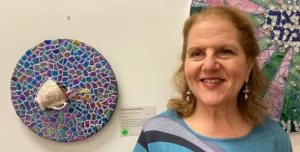
By Rabbi Gila Colman Ruskin
Parshat Vayeshev
I just finished reading “The Other Einstein” by Marie Benedict, published in 2016.
How disturbing was this depiction of Albert Einstein’s first wife and collaborator, Mileva Maric, a brilliant mathematician who may have been the actual author of the theory of relativity. How distressing was Einstein’s abject neglect of his family and his attempts to erase Mirac’s scientific contributions from history, depriving her of sharing the Nobel Prize.
My view of his greatness has been significantly dampened by this (somewhat fictionalized) account of his personal cruelty toward her.
As we read this week Parshat Vayeshev, how striking are the remarkable parallels between the alleged heroics of our ancestor Judah, son of Jacob, and Albert Einstein.
Both men lived in times when men utterly controlled the financial and social fate of women, when their word would be believed over any woman’s claim. Both of them could have had their reputations marred by being shamed by a brilliant, yet powerless woman. But the difference in their reactions to this risk spells the difference between accomplishment and true valor.
You, our readers, may not be familiar with the 38th chapter of Genesis. The story of Tamar was never taught in the religious school I attended, nor in the day school my children attended. With its references to a harlot, masturbation and burning at the stake, even adults may be alienated from what seems like a sordid tale.
That is indeed sad; Tamar was definitely a heroine, paired with the ancestor from whom most of us Jews claim our descent: Judah, son of Jacob.
The behavior of this childless widow seemed debauched when she seduced her father-in-law Judah by disguising herself as a prostitute, seeking to be impregnated by him. Yet her actions were driven by noble intention: continuing the family line of her deceased husband Er. In contrast, after his wife died, Judah relinquished his responsibility as tribal leader by squandering his “seed” with a prostitute while on his way to a festival with a friend.
To guarantee payment for sexual services, Tamar shrewdly demanded that Judah leave with her his seal, cord and staff until he can send payment. When Judah’s friend attempts to deliver payment and retrieve the personal effects, the prostitute is nowhere to be found. Judah worries about becoming a laughingstock.
When Tamar does become pregnant and the news is revealed to Judah, he resolves to have her burned, as is his prerogative as tribal chief. Why? Because having had sexual relations with one outside his household, when she is his son’s widow, could bring shame to Judah.
Tamar then presents to Judah his personal effects. Judah rises above his fear of being shamed, publicly acknowledging that Tamar was in the right. He declares that he would claim her and her offspring as his family and his future. Tradition tells us that as a result of Judah’s acknowledgment, God decided to appoint him as the ancestor of King David, and of us, the Jewish people.
In contrast, Einstein, when confronted with the news that Maric is pregnant with his child out of wedlock, refuses to acknowledge the child, finds excuses not to marry her, claiming that his reputation would be ruined. The baby is left with her parents, and they wed. When that child dies of scarlet fever, Einstein seems relieved. Although the groundbreaking discoveries in physics resulted from their combined study and collaboration, he removes Maric’s name from their publications.
As his reputation grows, his mistreatment of her increases. She and her children are dependent on his earnings.
She has no opportunity to proclaim to the world the truth, that these were her ideas, her mathematical findings; the articles were her compositions. Finally, when infidelities are revealed, she musters the courage to find a lawyer who crafts a divorce agreement entitling her to the cash award for the Nobel Prize that she is certain he will win. She leaves with her children; Einstein marries his cousin, leaves for America and goes on to fame and fortune.
Life presents us all with opportunities to transcend the fear of shame and to do what is right. Will we be Judahs or Einsteins?
Rabbi Gila Colman Ruskin, emerita of Temple Adas Shalom in Havre de Grace, Maryland, is an artist of Mosaic Midrash, which is displayed at Beth David Reform Congregation in Gladwyne. The Board of Rabbis of Greater Philadelphia is proud to provide diverse perspectives on Torah commentary for the Jewish Exponent. The opinions expressed in this column are the author’s own and do not reflect the view of the Board of Rabbis.



